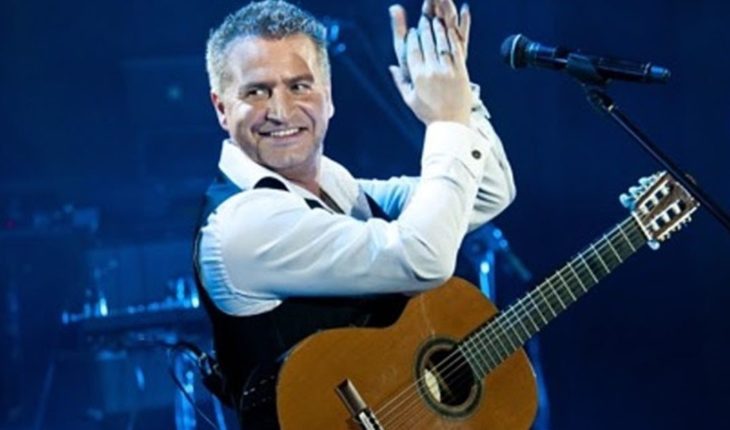He was born and raised in Moscow, the heart of Russia. As a child he became interested in the art world, so he enrolled in a music school and at 12 composed his first song “El Mar”, which already sounded “half Latino”. “No one understood how it could sound like that, because I couldn’t hear Latin music anywhere. Well, there were some songs in ‘Spanish style’, as it was called at the time. But I couldn’t hear it, it looks like I already had that taste in it somehow,” recalls Leonid Agutin, in dialogue with this medium. When he finished study, he had to attend military service in the KGB army at the border. However, his artistic spirit burned in his veins, so in the second part of the service he was chosen for the orchestra, which gave him experience in writing scores.” When I came back from the army I started making pop music because at every stage of my life I wrote songs that people liked. All the time they were telling me that my songs had to ring. I was a little sorry, I thought I didn’t do a serious job, because I’m a jazz musician,” he confesses.
Photo: instagram @agutinleonid
That’s how he began writing songs for different popular artists in the country and adding recognition. However, he discovered that many songs “didn’t sound so good on other artists,” so he was encouraged to sing.” In Russia this is called author and interpreter. I decided that what I like the most is the same as all Spanish-speaking and Latin: a little flamenco, rumba, samba, salsa, cha cha cha, but it did it in a way closer for us, more European, with a fusion that allowed to get used to our audience. What I liked is that Russian language made a good combination with Latin rhythms, we are quite close phonetically,” he says. That natural combination became a great discovery and a surprise for the music scene, he claims. This is how he built his 27-year career, until its most recent release: “La Vida Cosmopolita con Sabor Latino”. The behind-the-scenes of his new album
With eleven songs, his new album combines pop and rock with salsa, merengue, vallenato, samba, danzón, cha cha cha and flamenco, so it became a hit with fans. The album’s songwriting process began in April last year, and by January was finished: “It was surprisingly fast. I’ve never worked like this before, because I always make arrangements with my musicians. In this case the arrangements were made by my Latin friends and they took away a lot of problems”.What was the motivation to create the album? “I’ve made a lot of Latin music, not so authentic, but adopted for the Russian public. I feel like there is a limit to this kind of music, here it is exotic and can’t be much. I understood that even if I wanted the Russian audience, it won’t support 10 full songs in this absolutely Latin style. I decided they’d listen to him only if he came from Latin America. And I finally understood that all those ideas that I have in my head and that I want to do for so many years I could only do in Spanish,” he says. The album features Diego Torres, Amaury Gutiérrez, Jon Secada and different Latin artists: “I’ve never had such an experience. Diego is a wonderful, wonderful boy. When I walked into the studio and saw him for the first time, he smiled and greeted me and at that moment I understood that I had that Latin personality that I love and that I was a good person, that’s where I was glad and calmed down. Since you look at it, it’s clear why is he singing in another language?
His previous album “Cosmopolitan Life” was in English, which “was not planned, it was pure creativity”. Those melodies, as it goes, were born to be in that language, so I wouldn’t do them in Russian. “From the beginning I knew it was music that should be sung in an international language. These songs have not translated into Russian, because I am convinced that this cannot be organic, they exist only in the language for which they were inspired”, expands. In this sense, the artist became the first Russian to sing in Spanish, which he defined as a “great challenge”; this was made clear by an anecdote: “For no one it is a secret that we Russians like to invite to have a few drinks, it is like an important ritual to meet a new person. While we were recording the video for ‘Stay’, Diego explained the lyrics in a deeper way and helped me with pronunciation, I would suddenly respond with lyrics in Russian, he tried to sing it and I would help him with pronunciation,” he recalls. “When we finished we went to the break room with billiards, piano and served the table. Later I invited him to listen to the whole record and we’re already starting to hug. Diego told me I make the music that Latino musicians should make, to rescue their roots. And a Russian comes and plays our music to remind us how valuable it is. It was a pleasure to hear that. Anyway, we became brothers musically,” he continues. How does quarantine live in Russia?
The diffusion of the material took place in full coronavirus quarantine; as the latest statistics indicated, 87,147 contagions were recorded in Russia, becoming the ninth country in the world in number of registered carriers.” In my country, as in almost everyone, the health system was unprepared or able to handle so many cases. And I think one of the biggest problems is that people with other diseases who also need help can’t get it in their entirety. I think soon that’s going to have consequences.” Said. Then, he added: “At the moment Russia has not suffered as much as Europe or the United States, but of course it is a big problem and it is growing, because we are not yet on peak. Most cases are in Moscow. That’s clear why our city is the most inhabited and is the resort.” Meanwhile, he says he is at home in solitary confinement with his family, and assured that the health crisis over the pandemic will have different consequences on his career and the music industry.” The industry fell into apathy and discouragement, it is depressed in appearance without the direct and live contact of the public with the artists. But on the other hand and seeing it from the positive side, how many musicians now have the possibility and time to create, how many new opportunities appear, for example, people start to transmit their music to the world from home, thanks to technology,” he said. In his personal case, during the month of quarantine he took the opportunity to create music for a film, to write two songs and perform at least 20 live broadcasts for radio stations, TV channels, and on social networks. “I think I’m somehow involved in helping them keep their spirits. Of course I don’t have the concerts right now, but I have online performances that are like concerts. It’s a new direction of work. Why not?” he says. The truth is that her Latin soul, the one that was already roaring since she was little, found her place and will continue to grow with every song: “I found my new Latin audience that I already love, we only need to receive a reaction from them to know what they think of the music I make for them. Sometimes I feel like I’m looking at a new novel, where I’m one of the characters and I’d like to know how it’s going to end, what happens next and if I’m going to win his heart. I also learned a few words in Spanish and I want to continue practicing”.What does the idea of boosting your career in the other part of the world represent for you?
I imagined myself singing in a meadow or a large park with lots of people in the Family of Latin American and Spanish-speaking audiences. And I meet there with my musicians singing, while the rhythm and melody of my music make people dance and smile. I imagine it that way. And I think it’s possible even if I’m 50. If I don’t think I’m going to make it happen, no idea is going to come to mind and no song will go down in history. Do not believe, for an artist who has a trajectory in another part of the world that in Latin America is difficult, try to promote your song without knowing if the public will accept you, because you are a new artist for them, no one knows you. It’s harder if you’re not a young man who plays something fashionable, something for today’s teenagers in the style they like. However the magic is not to give up and somehow seek to reach their hearts and find more and more friends who identify with you and your music. In this note:
Leonid Agutin
Russia
Diego Torres





